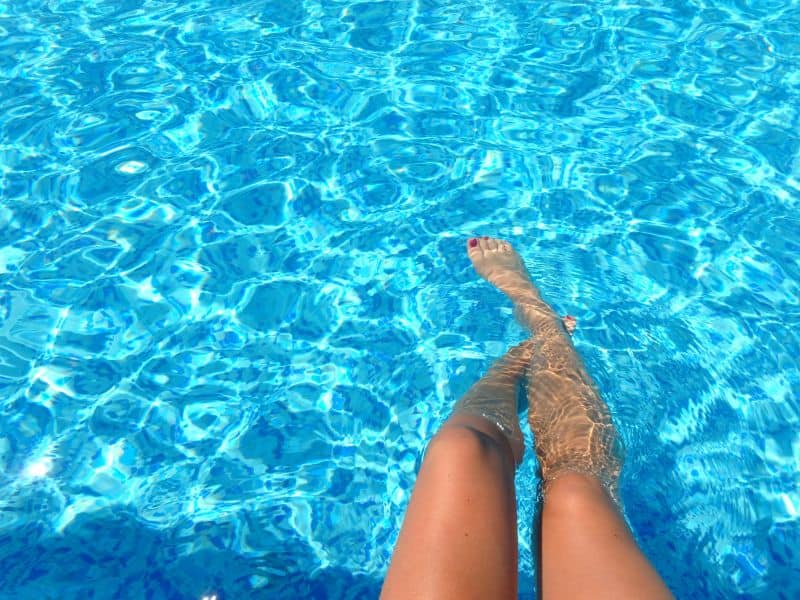
29 Jul Is Pool Water Bad for Your Smile? What Chlorine Does to Your Teeth
Is Pool Water Bad for Your Smile? What Chlorine Does to Your Teeth + Surprising Truths + 10 Must-Know Facts
There’s nothing quite like diving into a cool swimming pool on a hot summer day. But while your body might thank you, your teeth might have a different opinion. If you’ve ever wondered, “Is pool water bad for your smile?”—you’re not alone. Chlorine, a key component in pool maintenance, can pose unexpected risks to your dental health.
This article dives deep into the hidden relationship between swimming pools and your teeth. From enamel erosion to swimmer’s calculus, we’ll explore 10 surprising ways pool water can affect your smile—and what you can do to protect it.
Understanding Pool Water: What’s Really in It?
The Role of Chlorine
Chlorine is the most commonly used chemical to disinfect pool water. It kills harmful bacteria and prevents algae growth, but it also alters the pH of the water. Ideally, a pool’s pH should be between 7.2 and 7.8. If it dips too low (more acidic), it can damage not only your skin and eyes but also your teeth.

Other Chemicals Found in Pool Water
Aside from chlorine, pool water can contain:
-
Bromine
-
Algaecides
-
pH balancers
-
Cyanuric acid
These substances are necessary for sanitation, but prolonged exposure can have side effects—especially for your enamel.
The Chemistry Between Chlorine and Your Teeth
How Chlorine Alters pH Levels
When chlorine interacts with water, it forms hypochlorous acid—a powerful disinfectant. However, this reaction can lower the water’s pH, making it more acidic. Acidic environments are the enemy of your enamel, leading to softening and, eventually, erosion.
Even a small, prolonged drop in pH can weaken the protective outer layer of your teeth. Swimmers who spend hours in chlorinated pools are especially at risk of this gradual damage. Over time, repeated exposure to acidic water can make your enamel more porous and vulnerable to staining.
Demineralization of Enamel
Your tooth enamel is the hardest substance in your body, but it’s not invincible. Chlorinated water can pull essential minerals like calcium and phosphate from your teeth. Over time, this leads to demineralization—a precursor to cavities, sensitivity, and decay.
Once enamel begins to lose minerals, it cannot regenerate naturally. This weakened state also creates a rougher surface, making it easier for plaque and bacteria to cling. Without intervention, demineralization can progress into irreversible enamel loss, requiring professional dental treatment.
10 Must-Know Effects of Pool Water on Oral Health
1. Enamel Erosion
Enamel wears down when exposed to acidic water. Swimmers who train several hours a day are particularly at risk of enamel thinning, which leads to sensitivity and discoloration.
2. Tooth Discoloration (Swimmer’s Calculus)
Swimmer’s calculus is a brownish discoloration that forms when chlorinated water reacts with saliva proteins. It mainly affects the front teeth and is hard to remove with brushing alone.
3. Gum Irritation
Chlorine can irritate and inflame soft gum tissues, especially in people with pre-existing periodontal issues.
4. Increased Sensitivity
Loss of enamel makes the inner layers of your teeth (dentin) more exposed, leading to discomfort when eating hot, cold, or sweet foods.
5. Dry Mouth
Prolonged exposure to chlorine may reduce saliva production, contributing to dry mouth and its associated risks, such as bacterial buildup and bad breath.
6. Dental Plaque Buildup
When your saliva’s natural balance is disrupted, plaque bacteria can thrive—accelerating tooth decay.
7. Increased Risk of Cavities
With enamel erosion, dry mouth, and plaque buildup combined, cavities can form more easily and quickly.
8. Orthodontic Issues
Chlorine may weaken the adhesive used in braces and other dental appliances, possibly leading to breakage or loosening.
9. Effects on Dental Work
Chlorinated water can stain or degrade dental crowns, veneers, and fillings over time.
10. Children’s Teeth Are More Vulnerable
Because children’s enamel is thinner and still developing, they are more susceptible to chlorine’s effects. Frequent swimming can accelerate erosion and discoloration in young swimmers.

Why Competitive Swimmers Are More at Risk
Swimmers who train regularly—especially in indoor pools—may spend over 20 hours a week exposed to chlorinated water. Studies have shown they have a higher prevalence of enamel erosion and swimmer’s calculus. Pool environments also often contain concentrated vapors and splashes, increasing oral exposure even more.
How to Protect Your Teeth from Pool Water
Rinse Immediately After Swimming
Rinsing with fresh water or a fluoride mouthwash after swimming can help wash away chlorine and balance oral pH. This quick step minimizes the time acidic water stays on your teeth. For best results, make rinsing part of your post-swim routine, just like drying off and showering.
Use a Fluoride Toothpaste
Fluoride strengthens enamel and helps resist acid attacks. A fluoride gel may be recommended for competitive swimmers. Consistent use can help replenish minerals lost during pool exposure. Ask your dentist if a prescription-strength fluoride product is right for you.
Drink Water Before and After Swimming
Staying hydrated promotes saliva production, which naturally neutralizes acids and defends against decay. Sipping water during breaks can also help wash away residual pool chemicals. Hydration supports overall oral and physical health while swimming.
Visit Your Dentist Regularly
Professional cleanings can remove swimmer’s calculus and spot early signs of enamel erosion. Regular checkups give your dentist the chance to recommend preventive treatments tailored to your swimming habits. Early detection is key to avoiding long-term damage.
Best Oral Care Products for Swimmers
Consider adding these to your dental toolkit:
-
Fluoride mouthwash like ACT Total Care
-
pH-balancing toothpaste
-
Hydration tablets to encourage saliva
-
Enamel-strengthening toothpaste such as Pronamel
Chlorine vs. Saline Pools: Which Is Better for Teeth?
Saltwater pools use a lower concentration of chlorine, making them gentler on your teeth. However, they’re not entirely risk-free—especially if the salt content increases acidity. While saline pools are generally better for oral health, they still require caution.
Saltwater can still contribute to enamel wear over time if pH levels are not properly balanced. Some swimmers notice less tooth sensitivity after switching from a chlorinated pool to a saline one. However, regular maintenance is key, as neglected saline pools can develop harmful bacteria and imbalanced water chemistry.
Even in saltwater, it’s smart to rinse your mouth after swimming to remove any lingering minerals or acids. Ultimately, the best pool for your teeth is one that is well-maintained and used in combination with good oral hygiene habits.
When to See a Dentist
Contact your dentist if you notice:
-
Brown or yellow stains
-
Sudden tooth sensitivity
-
Bleeding gums after swimming
-
Loose fillings or dental work

FAQs
Can swimming in pools every day damage your teeth?
Yes, especially if the pool’s pH is not properly balanced. Daily exposure increases the risk of enamel erosion and discoloration.
What is swimmer’s calculus?
Swimmer’s calculus is a brown stain on teeth caused by prolonged exposure to chlorine. It typically affects the front teeth and is difficult to remove without professional cleaning.
Do saltwater pools harm your teeth too?
Saltwater pools contain less chlorine but can still affect your enamel if pH levels are off. They’re generally safer but not entirely without risk.
How do I prevent chlorine from staining my teeth?
Rinse after swimming, brush with fluoride toothpaste, and use a straw when drinking acidic beverages to reduce additional acid exposure.
Are kids’ teeth more at risk in pools?
Yes. Children’s enamel is thinner and more prone to erosion. Supervision and preventive care are key.
Is pool water worse for braces or dental implants?
Yes, chlorine can weaken orthodontic adhesives and stain dental prosthetics. Consult your orthodontist if you’re a frequent swimmer.
Conclusion
Swimming is a fun, healthy activity—but it’s not without risks to your smile. Chlorine and other pool chemicals can erode enamel, cause discoloration, and even damage dental work. But don’t panic—by following preventive tips, choosing the right oral care products, and seeing your dentist regularly, you can protect your pearly whites all season long.
So next time you dive in, remember: your smile deserves just as much care as your stroke technique!


Sorry, the comment form is closed at this time.